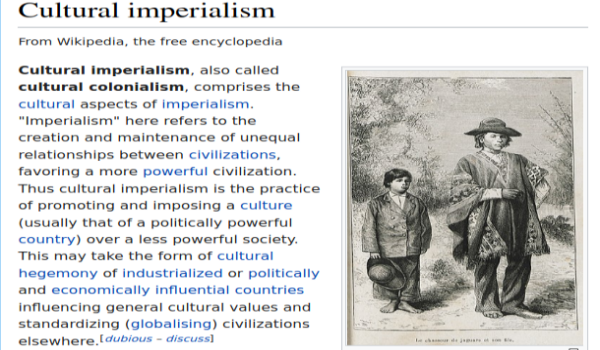For non-westerners, it's harder to write in Wikipedia
Did you already know that?
Frederick Norhona (FN) is an independent journalist based in Goa, India. To know more about his great work, see his Wikipedia page (which is ironic, as you will read in a moment), or follow him on Twitter. A few days ago, I had with him on Facebook the conversation below, that I gratefully copy here with his permission, because it exposes a flaw of Wikipedia that we “westerners”, more often than not, completely fail to see.

FN: Wikipedia was a fun place in its early days, and allowed for a lot of creativity. But somewhere along the way, a whole lot of entries started getting rejected. I failed in my efforts to convince editors that not-very-digitised societies, without intense media coverage, and often dependent on a lot of oral communication, cannot be easily “sourced” and “cited” at Western levels….
me: I am very interested to know more about [the Wikipedia problems of] “not-very-digitised societies”. May I ask you to elaborate on that?
FN: It’s very hard to get citations when there are few newspapers (compared to the West), few books, covering few topics. Most subjects relevant to our societies don’t make it to print. If they do, they are often not digitised. If they are digitised, even fewer reach online. Or are archived efficiently. So how does one find sources and citations at Western levels?
FN: (reporting someone else’s comment) “it is important to recognise that it is often harder to gather sources and establish notability in India than in countries that have greater internet penetration.”
FN: We need to rethinking knowledge-generation and collation in pre-information societies. Or oral-information societies. One-size-fits-all simply won’t work.
Image source: screenshot of the Wikipedia page on cultural imperialism
Who writes this, why, and how to help
I am Marco Fioretti, tech writer and aspiring polymath doing human-digital research and popularization.
I do it because YOUR civil rights and the quality of YOUR life depend every year more on how software is used AROUND you.
To this end, I have already shared more than a million words on this blog, without any paywall or user tracking, and am sharing the next million through a newsletter, also without any paywall.
The more direct support I get, the more I can continue to inform for free parents, teachers, decision makers, and everybody else who should know more stuff like this. You can support me with paid subscriptions to my newsletter, donations via PayPal (mfioretti@nexaima.net) or LiberaPay, or in any of the other ways listed here.THANKS for your support!